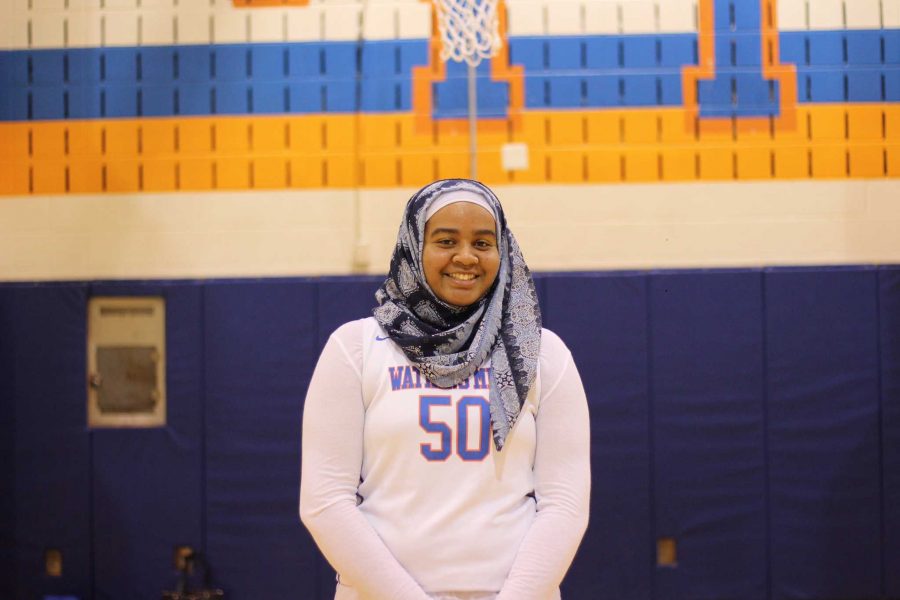Little-known national sports rule sidelines hijabi player, spotlights confusion
Je’Nan Hayes, a junior at Watkins Mill, finished her first season of organized basketball on the sidelines after referees told her coaches that due to national sports rules, she wasn’t allowed to play in her hijab. Photo courtesy Je’Nan Hayes.
March 23, 2017
Members of the Watkins Mill girls basketball team were excited to play in a March 3 regional finals basketball game, the culmination of their season. During the game, coaches attempted to ensure that every girl had a chance to showcase her skills, and they all did—except for junior Je’Nan Hayes.
Immediately prior to the game, a referee informed the Watkins Mill coaches that Hayes wouldn’t be allowed to play if she wore her hijab, as she hadn’t previously applied for the necessary state approval for headwear.
Coaches chose to wait until after the game to tell Hayes why she didn’t play.
“I felt angered and upset,” Hayes said. “My hijab should not have been the reason I was held back from playing.”
The rule which prohibits “decorations and headwear” first appeared in the 1992-1993 National Federation of State High School Associations (NFHS) rulebook as a safety precaution.
“In some cases, the headwear caused a safety concern because of the material involved, because it obstructed vision or because of the potential hazard if it came off and fell to the floor,” said Theresia Wynns, the Director of Sports and Officials at the NFHS.
Today, the NFHS rulebook specifies that if “documented evidence” is provided to a state association that a student can’t expose their head for religious, medical or cosmetic reasons, the state association can approve “a covering or wrap which is not abrasive, hard or dangerous to any other player and which is attached in such a way it is highly unlikely it will come off during play.”
Each exception—religious, medical or cosmetic—has a slightly different approval process, which must be completed prior to the season.
The action taken by the contest officials [was] within what is allowed in the rules.
— Director of Sports and Officials at the NFHS Theresia Wynns“If it is a medical issue, the doctor writes a note of support for that student. If it is a religious reason, documentation needs to be given to the coach and school by the student-athlete and family,” Wynns said. “The school’s responsibility is to reach out to the state association. The state then gives a letter of approval which the coach is required to carry to every game and produce for the contest officials.”
The Maryland Public Secondary School Athletic Association (MPSSAA) regularly receives requests for such exceptions and frequently grants these requests, said William Reinhard, Director of Communications at the Maryland State Department of Education.
But despite efforts by the MPSSAA to educate local athletics officials about national regulations, the Watkins Mill team was unaware of the rule’s existence and the approval procedure.
Hayes had played in all of the first 24 games of the season; the referees at the regional final game were the first to inform coaches of the rule and to enforce it.
“Unfortunately, the officials made a strict interpretation of the National Federation of State High Schools playing rules for basketball instead of the spirit of the rule designed to ensure safety and competitive fairness,” Reinhard said on behalf of the MPSSAA. “There should have been no denial of participation.”
The NFHS stands by the officials’ actions as being in line with current policy.
“The action taken by the contest officials [was] within what is allowed in the rules,” Wynns said. “The referee cannot approve the wearing of headwear unless the written statement is provided or unless the state has a special ruling that allows for the use of headwear approved through another process.”
I want to know why I need a waiver stating that I am an observer of a certain religion, doesn’t my hijab do that?
— junior Je'Nan HayesThough they have slightly different interpretations of the situation, both the state and national organizations are looking into possible methods of ensuring a similar incident isn’t repeated.
“We are committed to working with the family and the school in an effort to make certain this does not come up again,” Reinhard said.
Hayes has begun to advocate to change what she sees as an outdated rule.
“I would like the rule to either be stricken from the book or have a clear definition of how one is to demonstrate their religion,” Hayes said.
To her, the current rule seems unfounded.
“I want to know why I need a waiver stating that I am an observer of a certain religion,” Hayes said. “Doesn’t my hijab do that?”
Hayes’ story, which was first reported by the Watkins Mill Current, has received significant attention from the press, including the Washington Post, Seventeen Magazine, and WTOP. In the weeks since the game, multiple groups—such as the Council on American-Islamic Relations, the Montgomery County Civil Rights Coalition, and the Montgomery County Board of Education—have come out in support of Hayes and against the rule. Rule change at the state level is possible, although not immediately.
“Our member state associations are autonomous and could go beyond this rule in the NFHS Basketball Rules Book and make a statewide rule that covers the issue,” Wynns said. “We will start that conversation this summer.”
Still, Hayes is hoping she doesn’t just inspire change on a local level.
“If this rule is to get changed, I don’t want it to just affect Maryland,” she said.
“I want it to affect the nation as a whole.”







